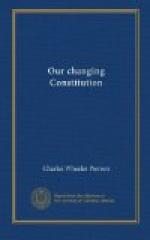XII
THE FEDERAL GOVERNMENT AND THE TRUSTS
The curbing of monopolies and combinations in restraint of trade was no part of the functions of the Federal Government as planned by the framers of the Constitution. To their minds such matters, under the dual system of government which they were establishing, belonged to the states. The Constitution was designed to limit the National Government to functions absolutely needed for the national welfare. All other powers were “reserved to the states respectively or to the people.”
As time went on, however, and industries expanded it was seen that the power of no single state was adequate to control concerns operating in many states at the same time. The need of action by the General Government became manifest. Power in Congress to legislate on the subject, albeit somewhat indirectly, was found in the Commerce Clause of the Constitution, and in the year 1890 the Sherman Anti-Trust Act was enacted.
Few statutes have aroused more discussion or been the subject of more perplexity and misunderstanding. President Taft’s remark, made after the decisions of the Supreme Court in the Standard Oil and Tobacco Trust cases,[1] that “the business community now knows or ought to know where it stands,” was received with incredulity approaching derision. Yet from a lawyer’s point of view (and it must be borne in mind that the President was a lawyer and is now Chief Justice of the Court) the statement cannot be controverted. The decisions in the Standard Oil and Tobacco cases did in fact dispel whatever uncertainty remained as to what the Sherman Act means.
[Footnote 1: Standard Oil Co. v. United States, 221 U.S., 1.
United States v. American Tobacco Co., id., 106.]
The Sherman Act[1] declares unlawful every contract, combination, or conspiracy in restraint of interstate trade, and every attempt to monopolize interstate trade. The legal uncertainties that have arisen in its enforcement have not been with respect to the meaning of the terms “restraint of trade” and “monopoly,” although the popular impression is to the contrary. In 1890, when the statute was passed, contracts in restraint of trade and monopolies were already unlawful at common law, and these terms, by a long series of decisions both here and in England, had been defined as definitely as the nature of the subject matter permitted. While incapable (like the term “fraud”) of precise definition covering all forms which the ingenuity of man might devise, nevertheless their meaning and scope were well within the understanding of any man of reasonable intelligence. Whatever legal uncertainties have arisen have been chiefly owing to two questions: first, What is interstate trade within the meaning of the act? and second, Did the act enlarge the common-law rule as to what restraints were unlawful?




